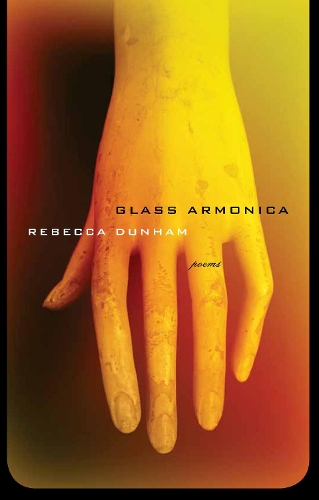
Glass Armonica: Poems
(Paperback)
Publishing Details
Glass Armonica: Poems
By (Author) Rebecca Dunham
Milkweed Editions
Milkweed Editions
1st January 2014
United States
Classifications
General
Non Fiction
Poetry / Poems
811.6
Physical Properties
Paperback
96
Width 139mm, Height 215mm
141g
Description
The 18th-century glass armonica, a musical instrument whose sound emits from rotating water-filled vessels, has long held the power to mesmerize with its hauntingly sorrowful tones. Just as its song, which was once thought to induce insanity, wraps itself in and around the mind, Rebecca Dunham probes the depths of human psyche, inhabiting the voice
Reviews
WINNER OF THE 2013 LINDQUIST & VENNUM PRIZE FOR POETRY "Rebecca Dunham's Glass Armonica is a beautifully crafted collection of poems--each an exquisite glass vase filled with water--that refuse stasis. They are alive with a kind of vision that transforms detail into world-changing meditations on the self, the body, and trauma--and the power dynamics behind ideas and methods of what a cure might mean." --American Microreviews "Dunham's searing third collection glows like a magma vent underwater. These exquisitely crafted poems offer a prismatic portrait of the female body in the act of being touched: the eponymous vessel, half-filled with water, that sounds when struck. Dido is here, and Elizabeth Bishop; Lavinia Dickinson and Gertrude Stein; Daphne du Maurier and the women treated for 'hysteria' by ninteenth-century male physicians. In the title sequence--a sonnet crown--the speaker recalls being sexually molested at summer camp when she was ten, and the long legacy of silence that particular touch evoked. Here is photography and the speculum, the unpeeling and the razor held to the skin, the braiding of hands and 'the bandage lovingly applied.' Dr. Franz Mesmer plays his star female patient 'like a glass armonica, pull[ing] tone upon / tone from her, for hours.' 'Not beauty,' these lush yet styptic poems remind us, but 'ravaging need / --its strange and sudden // promise' flayed, 'field / of loosestrife threshed to a fine flame.'" --G. C. Waldrep "Rebecca Dunham's stunning new collection, Glass Armonica, is a journey into the uncanny, into a poetic garden of earthly delights. The book's haunting title sequence, a crown of sonnets, weaves together multiple narratives, past and present, to investigate notions of hysteria, from the work of Jean-Martin Charcot to mesmerism to young girls at summer camp. In lush, gorgeous language, the poems in Glass Armonica both enchant and unsettle us." --Nicole Cooley "Obliquely narrative, rich in lyric resonance and implicative catalog, the textured terms of Dunham's Glass Armonica obtain an expansive portrait of the self as complex constellation, and in so doing oblige the reader's own collaborative intimacy, yielding a genuine eros whose necessarily troubled song continues its music well beyond the page." --Scott Cairns "Reading Rebecca Dunham's Glass Armonica is akin to discovering the sharpness of bone shard or shrapnel risen just beneath the surface of one's skin: the odd advent of injury's return despite the appearance of a wound thought long-healed. Face the holy and its unholy. Face the Error. Witness the pairing of Mystery and Woe, the equation of their shared vertigo. I'm pleased to report that every poem in this collection is wired to shatter its own lens on demand." --Cate Marvin Praise for The Flight Cage: "Stunning formal innovation." -- Eric Pankey "An enormously compelling reading experience." -- Sherod Santos "Near-hypnotic, and emotionally evocative." -- The Rumpus Praise for The Miniature Room: WINNER OF THE 2006 T.S. ELIOT PRIZE "Deeply melodious and intelligent." -- Naomi Shihab Nye
Author Bio
Rebecca Dunham was born in Portsmouth, New Hampshire, and has earned degrees from the University of Virginia, Hollins University, George Mason University, and the University of Missouri. She is the author of two collections of poetry, The Miniature Room and The Flight Cage. Dunham was the Jay C. and Ruth Halls Fellow in Poetry at the Wisconsin Institute for Creative Writing and has been awarded a National Endowment for the Arts fellowship. Her poems have appeared widely in journals such as The Iowa Review, Prairie Schooner, Crazyhorse, AGNI, Colorado Review, FIELD, Crab Orchard Review, TriQuarterly, and The Antioch Review. She is a professor in the doctoral creative writing program at the University of Wisconsin-Milwaukee and lives in Bayside, WI.
